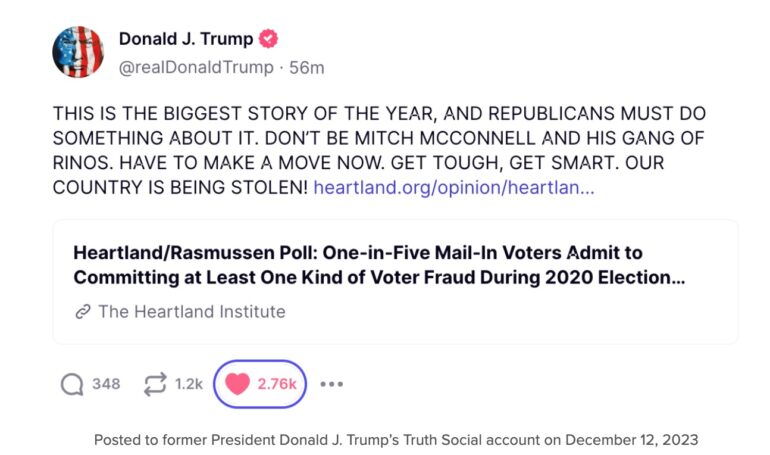Biden boasts about those 81 million votes — but what impact does this poll have on the reliability of that number?
Long before America went to those contested polls, people were raising questions about the risks associated with mail-in ballots.
Absentee ballots remain the largest source of potential voter fraud.” That quote isn’t from President Trump, who criticized mail-in voting this week after Wisconsin Democrats tried and failed to change an election at the last minute into an exclusively mail-in affair. It’s the conclusion of the bipartisan 2005 report of the Commission on Federal Election Reform, chaired by former President Jimmy Carter and former Secretary of State James Baker III. — WSJ, Apr 10, 2020
Past and future elections alike still have lingering questions about their reliability for any number of reasons, especially as relates to how mailed-in ballots can be exploited.
In recent weeks, we’ve seen several elections overturned exactly because the results had become tainted with the use of mail-in ballots.
Before that, we learned that Arizona has discovered a problem with non-citizens voting in Federal elections.
At least 5,600 federal-only ballots cast in Arizona 2020 election without US citizenship proof | Just The News https://t.co/FBr7Up5jpy
— John Solomon (@jsolomonReports) December 10, 2023
Now, Rasmussen and Heartland Institute have paired up to produce a poll of 1,085 likely voters with a roughly 1/3 weighting for Republican (33%), Democrat(36%), and Independent(31%).
Voters were shockingly candid about various ways they gamed the system in 2020.
When asked, “During the 2020 election, did you fill out a ballot, in part or in full, on behalf of a friend or family member, such as a spouse or child?”, 21% of respondents who said they voted by mail answered “yes.” (Filling out a ballot for someone else is illegal in all states, although many states allow people to assist others with voting.)
Additionally, 17% of mail-in voters said they voted “in a state where you were no longer a permanent resident.” Seventeen percent of mail-in voters also admitted to signing a “ballot or ballot envelope on behalf of a friend or family member.” (Both voting in a state where you are no longer a permanent resident and forging a signature on a ballot or ballot envelope are fraudulent activities that invalidate votes, when caught by election officials.)
According to election data, more than 43 percent of 2020 voters cast ballots by mail, the highest percentage in U.S. history.
Further, 10% of all respondents — not just those who said they voted by mail — claimed that they know “a friend, family member, co-worker, or other acquaintance who has admitted … that he or she cast a mail-in ballot in 2020 in a state other than his or her state of permanent residence.”
Eight percent of all respondents said “a friend, family member, or organization, such as a political party” offered them “pay” or a “reward” for agreeing to vote in the 2020 election.
Taken together, the results of these survey questions appear to show that voter fraud was widespread in the 2020 election, especially among those who cast mail-in ballots. — Heartland Institute
Needless to say, Trump thought this was a pretty big deal.

But what does it say if some 20% of people who were contacted actually admitted to having corrupted the electoral system?
Are we to believe that polls of this size can capture an accurate snapshot of everything else, but NOT this??
What are we to make of 21% of respondents claiming to have filled out someone else’s ballot? Or 17% admitting to voting outside the district in which they lived? Or 17% who signed someone else’s name to a ballot? What about those who admitted to knowing they had friends who broke the law? Or who claimed to have been offered incentives to vote a certain way?
Both Joe Biden and Bill Barr affirmed that the election was super-secure.
The original ‘Stop The Steal’ rallies weren’t an effort to ‘overturn’ anything at all.
It was an expression of the people saying ‘trust but verify’.
GOP legislatures had a plan in place to fast-track a process of looking into exactly the sort of questions raised here. If the official ballot results held up as the battleground states in question having played by the rules? Great.
If not, the Constitution has specific provisions in place for how to resolve those questions as well.

